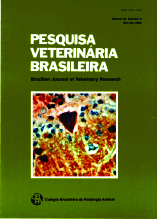 |
|
|
|
Year 2002 - Volume 22, Number 2
|

|
Fetal protection against challenge with bovine viral diarrhea vírus (BVDV) in pregnant ewes immunized with two strains experimentally attenuated, 22(2):64-72
|
ABSTRACT.- Brum M.C.S., Weiblen R., Flores E.F, Tobias F.L., Pituco E.M. & Winkelmann E.R. 2002. [Fetal protection against challenge with bovine viral diarrhea vírus (BVDV) in pregnant ewes immunized with two strains experimentally attenuated.] Proteção fetal frente a desafio com o vírus da Diarréia Viral Bovina (BVDV) em ovelhas prenhes imunizadas com duas amostras de vírus atenuadas experimentalmente. Pesquisa Veterinária Brasileira 22(2):64-72. Depto Medicina Veterinária Preventiva, Centro de Ciências Rurais, Universidade Federal de Santa Maria (DMVP/CCR/UFSM), Santa Maria, RS 97105-900, Brazil. E-mail: flores@ccr.ufsm.br
Two isolates of bovine viral diarrhea virus (BVDV) submitted to multiple passages in tissue culture associated with ultraviolet irradiation were evaluated as vaccine virus candidates. The attenuation of the modified viruses was assessed in calves and in pregnant ewes. Intramuscular inoculation of the viruses in four seronegative calves produced only a mil d and transient rise in body temperature, followed by the production of high titers of neutralizing antibodies. The viruses were not detected in nasal secretions or in the blood following inoculation. However, intramuscular inoculation of these viruses in four pregnant ewes resulted in transplacental transmission and infection of ali fetuses. To assess fetal protection conferred by immunization, pregnant ewes immunized twice with the modified viruses were subsequently challenged by intranasal inoculation of BVDV-1 (SV-126.8, n=6) or BVDV-2 (SV-260, n=5). At the day of challenge (134 days after the second immunization), ali ewes had high titers of neutralizing antibodies (256 to >4096) to the vaccine viruses and variable titers (8 to >4096) to Brazilian BVDV-1 and BVDV-2 field isolates. Fifteen days after challenge, the ewes were euthanized and fetal tissues were examined for infectivity. Ali fetuses from non-vaccinated, challenged ewes (n=4) were infected. In contrast, none of the fetuses from the immunized dams (n = 11) were positive for virus, indicating that the immunological response induced by immunization with the vaccine candidate viruses was capable of preventing fetal infection. These results indicate that it is possible to achieve fetal protection to BVDV by induction of a strong immunological response using modified live vaccines. |
| |
|
|
| |
|
 |